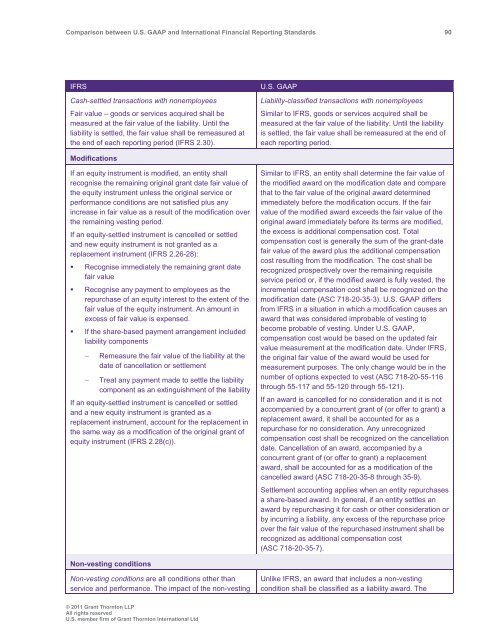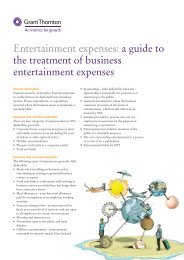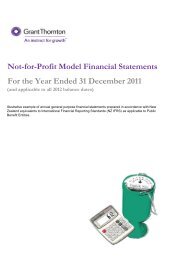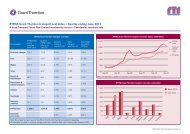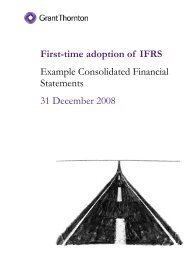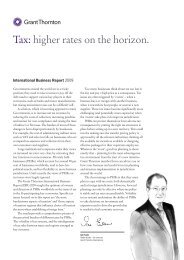Comparison between U.S. GAAP and International ... - Grant Thornton
Comparison between U.S. GAAP and International ... - Grant Thornton
Comparison between U.S. GAAP and International ... - Grant Thornton
Create successful ePaper yourself
Turn your PDF publications into a flip-book with our unique Google optimized e-Paper software.
<strong>Comparison</strong> <strong>between</strong> U.S. <strong>GAAP</strong> <strong>and</strong> <strong>International</strong> Financial Reporting St<strong>and</strong>ards 90<br />
IFRS<br />
Cash-settled transactions with nonemployees<br />
Fair value – goods or services acquired shall be<br />
measured at the fair value of the liability. Until the<br />
liability is settled, the fair value shall be remeasured at<br />
the end of each reporting period (IFRS 2.30).<br />
U.S. <strong>GAAP</strong><br />
Liability-classified transactions with nonemployees<br />
Similar to IFRS, goods or services acquired shall be<br />
measured at the fair value of the liability. Until the liability<br />
is settled, the fair value shall be remeasured at the end of<br />
each reporting period.<br />
Modifications<br />
If an equity instrument is modified, an entity shall<br />
recognise the remaining original grant date fair value of<br />
the equity instrument unless the original service or<br />
performance conditions are not satisfied plus any<br />
increase in fair value as a result of the modification over<br />
the remaining vesting period.<br />
If an equity-settled instrument is cancelled or settled<br />
<strong>and</strong> new equity instrument is not granted as a<br />
replacement instrument (IFRS 2.26-28):<br />
• Recognise immediately the remaining grant date<br />
fair value<br />
• Recognise any payment to employees as the<br />
repurchase of an equity interest to the extent of the<br />
fair value of the equity instrument. An amount in<br />
excess of fair value is expensed.<br />
• If the share-based payment arrangement included<br />
liability components<br />
<br />
Remeasure the fair value of the liability at the<br />
date of cancellation or settlement<br />
Treat any payment made to settle the liability<br />
component as an extinguishment of the liability<br />
If an equity-settled instrument is cancelled or settled<br />
<strong>and</strong> a new equity instrument is granted as a<br />
replacement instrument, account for the replacement in<br />
the same way as a modification of the original grant of<br />
equity instrument (IFRS 2.28(c)).<br />
Similar to IFRS, an entity shall determine the fair value of<br />
the modified award on the modification date <strong>and</strong> compare<br />
that to the fair value of the original award determined<br />
immediately before the modification occurs. If the fair<br />
value of the modified award exceeds the fair value of the<br />
original award immediately before its terms are modified,<br />
the excess is additional compensation cost. Total<br />
compensation cost is generally the sum of the grant-date<br />
fair value of the award plus the additional compensation<br />
cost resulting from the modification. The cost shall be<br />
recognized prospectively over the remaining requisite<br />
service period or, if the modified award is fully vested, the<br />
incremental compensation cost shall be recognized on the<br />
modification date (ASC 718-20-35-3). U.S. <strong>GAAP</strong> differs<br />
from IFRS in a situation in which a modification causes an<br />
award that was considered improbable of vesting to<br />
become probable of vesting. Under U.S. <strong>GAAP</strong>,<br />
compensation cost would be based on the updated fair<br />
value measurement at the modification date. Under IFRS,<br />
the original fair value of the award would be used for<br />
measurement purposes. The only change would be in the<br />
number of options expected to vest (ASC 718-20-55-116<br />
through 55-117 <strong>and</strong> 55-120 through 55-121).<br />
If an award is cancelled for no consideration <strong>and</strong> it is not<br />
accompanied by a concurrent grant of (or offer to grant) a<br />
replacement award, it shall be accounted for as a<br />
repurchase for no consideration. Any unrecognized<br />
compensation cost shall be recognized on the cancellation<br />
date. Cancellation of an award, accompanied by a<br />
concurrent grant of (or offer to grant) a replacement<br />
award, shall be accounted for as a modification of the<br />
cancelled award (ASC 718-20-35-8 through 35-9).<br />
Settlement accounting applies when an entity repurchases<br />
a share-based award. In general, if an entity settles an<br />
award by repurchasing it for cash or other consideration or<br />
by incurring a liability, any excess of the repurchase price<br />
over the fair value of the repurchased instrument shall be<br />
recognized as additional compensation cost<br />
(ASC 718-20-35-7).<br />
Non-vesting conditions<br />
Non-vesting conditions are all conditions other than<br />
service <strong>and</strong> performance. The impact of the non-vesting<br />
Unlike IFRS, an award that includes a non-vesting<br />
condition shall be classified as a liability award. The<br />
© 2011 <strong>Grant</strong> <strong>Thornton</strong> LLP<br />
All rights reserved<br />
U.S. member firm of <strong>Grant</strong> <strong>Thornton</strong> <strong>International</strong> Ltd


